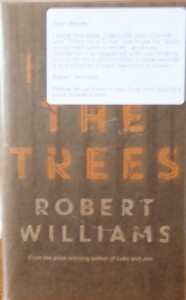Into The Trees
Monday, April 28th, 2014I was walking into the trees in my local Park Part One (officially The Granville Road Spinney) the other day when I saw a package propped up on a bench. I no longer expect such things to be bombs, so I picked it up. It was a hardback book, with a note on the oilskin wrapping which read:
Dear Reader
I hope this book captures you in some way. That’s all a writer can hope for really, to connect with a reader. And how wonderful if it happened with you finding this book on a platform/on a tube seat/at a bus stop/on a park bench/in a forest.
Robert Williams
Please let us know if you find and read this book @faberbooks
Curious — who wouldn’t be? — I took the package home, and unwrapped it. It was a novel written by Robert Williams, published by Faber & Faber, and titled “Into The Trees”. £14.99 retail, neatly packaged and left on a bench.
As a quondam book publicist, leaving hardback books lying around willy nilly for members of the public to pick up strikes me as a really expensive, untargeted marketing tool. Where are the metrics? How do you gauge a response?
I read it. Well, I started. Perhaps I should have written “left sat on a bench”, because at least 16 times Faber & Faber’s editors let the current appalling grammatical solecism of substituting the passive for present and past participles ride:
- “Sat in their front room in Maltham …”
- “… it was a house stood in front of him.”
- “Raymond was stood in the kitchen …”
- “He found Raymond sat at the kitchen table …”
- “He envisaged the pair of them sat in a farmhouse kitchen …”
- “… he was part of a group of men sat in the back room …”
- “She remained stood by the phone …”
- “… Raymond found himself stood outside the Tillotsons.”
- “… directly to where he was now stood.”
- “… Ann had found them in Daniel’s room, sat on opposite sides of his bed …”
- “… Ann was stood at the bottom of the back garden …”
- “… until he was sat in Etherton job centre years later …”
- “Sat with the Nortons on top of Liverstock Fell …”
- “… now she was sat on the couch with knees up …”
- “He didn’t ask for his notebooks … which were sat firmly under the monitor.”
- “It was early evening and they were all sat around the table.”
This just grates. It’s plain wrong. Had the book been written in dialect, I might have understood, but the rest of the book is in plain unaccented text. There appears to be no reason why grammar should be deliberately flouted in these instances. It’s such a pity, because otherwise the novel would have been perfectly readable. As it was, I gave up paying attention about halfway through and spent the rest of my time hunting down grammatical mistakes.
This usage has crept into common British parlance from northern dialect only this century. It is virtually unknown in the USA, and this novel would baffle any American reader. Why so many mistakes, they would ponder?
Here’s another one that made me pause:
- “And within days the house did smell differently, the sweet smell of dampness had begun to fade.”
It wasn’t the house that was doing the smelling. The house smelled different, not differently. It’s just wrong! If it’s ignorant writing, then it’s also bad editing. From Faber & Faber?
So to help Faber sell an American edition, here is the proper English text as it should am being wrote:
- “Sitting in their front room in Maltham …”
- “… it was a house standing in front of him.”
- “Raymond was standing in the kitchen …”
- “He found Raymond sitting at the kitchen table …”
- “He envisaged the pair of them sitting in a farmhouse kitchen …”
- “… he was part of a group of men sitting in the back room …”
- “She remained standing by the phone …”
- “… Raymond found himself standing outside the Tillotsons.”
- “… directly to where he was now standing.”
- “… Ann had found them in Daniel’s room, sitting on opposite sides of his bed …”
- “… Ann was standing at the bottom of the back garden …”
- “… until he was sitting in Etherton job centre years later …”
- “Sitting with the Nortons on top of Liverstock Fell …”
- “… now she was sitting on the couch with knees up …”
- “He didn’t ask for his notebooks … which were sitting firmly under the monitor.”
- “It was early evening and they were all sitting around the table.”
- “And within days the house did smell different, the sweet smell of dampness had begun to fade.”
Which raises another point. Far too many Sits and Stoods. Other words and phrases are available in Shakespeare’s language. I’m sorry to be so pedantic and hypercritical, but trying to read this novel was like hearing chalk grating on a blackboard while listening to the James Last Orchestra.
And, Faber & Mr Williams, you asked for it, by leaving the book lying around.
Or should that be laid around?


